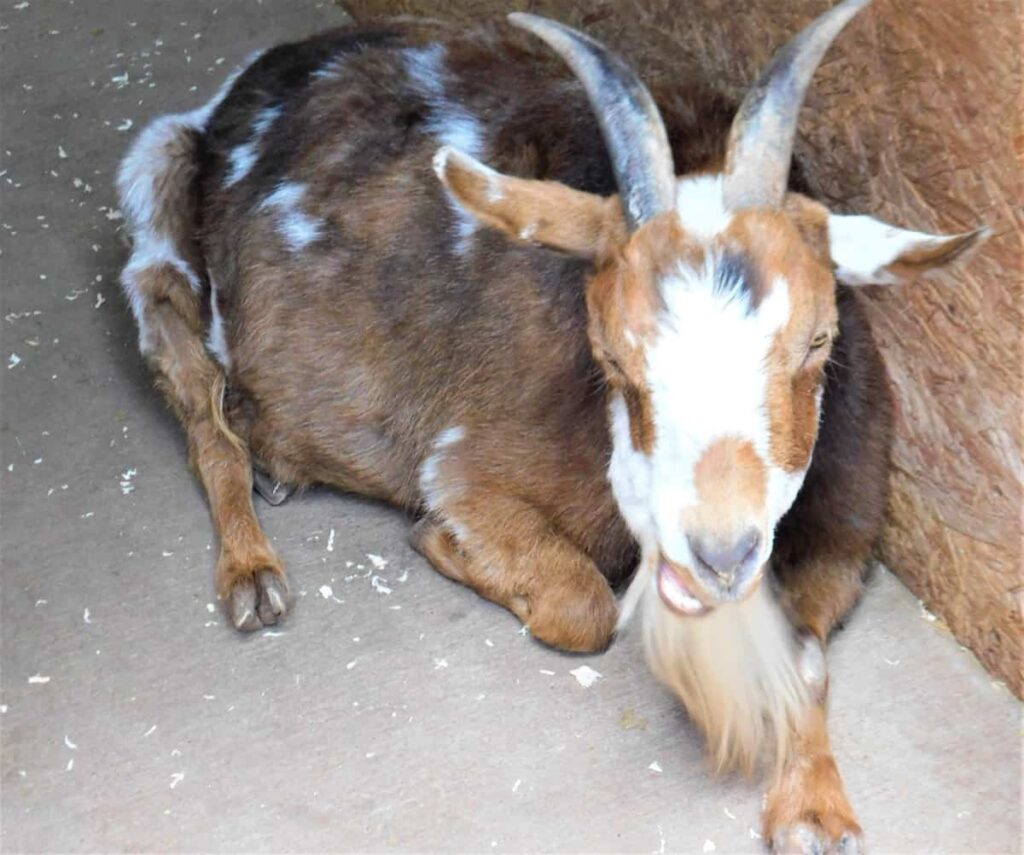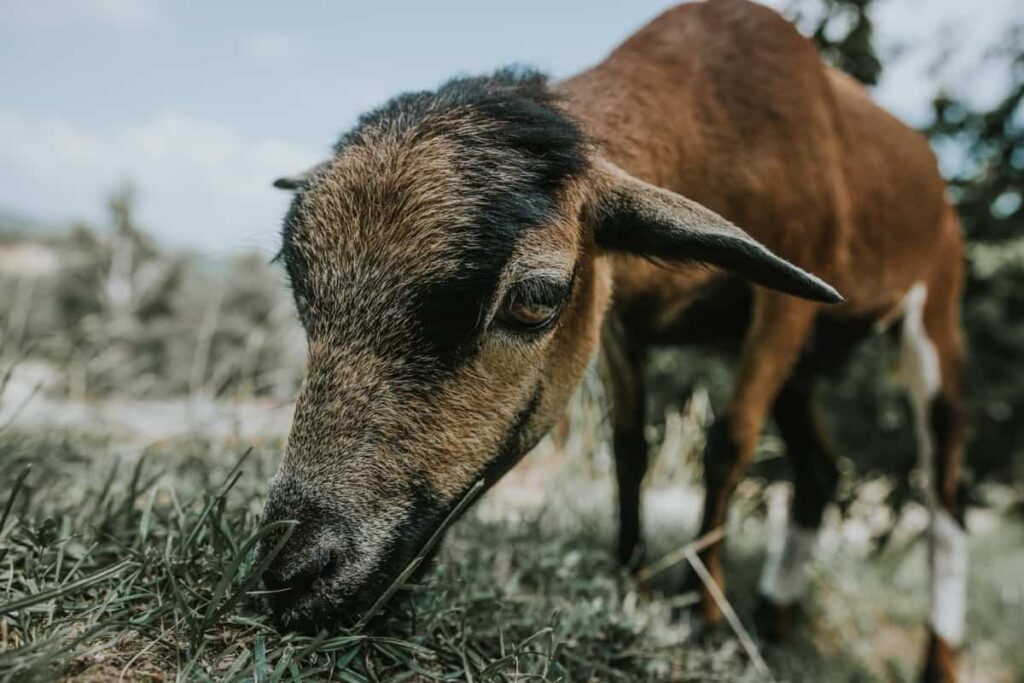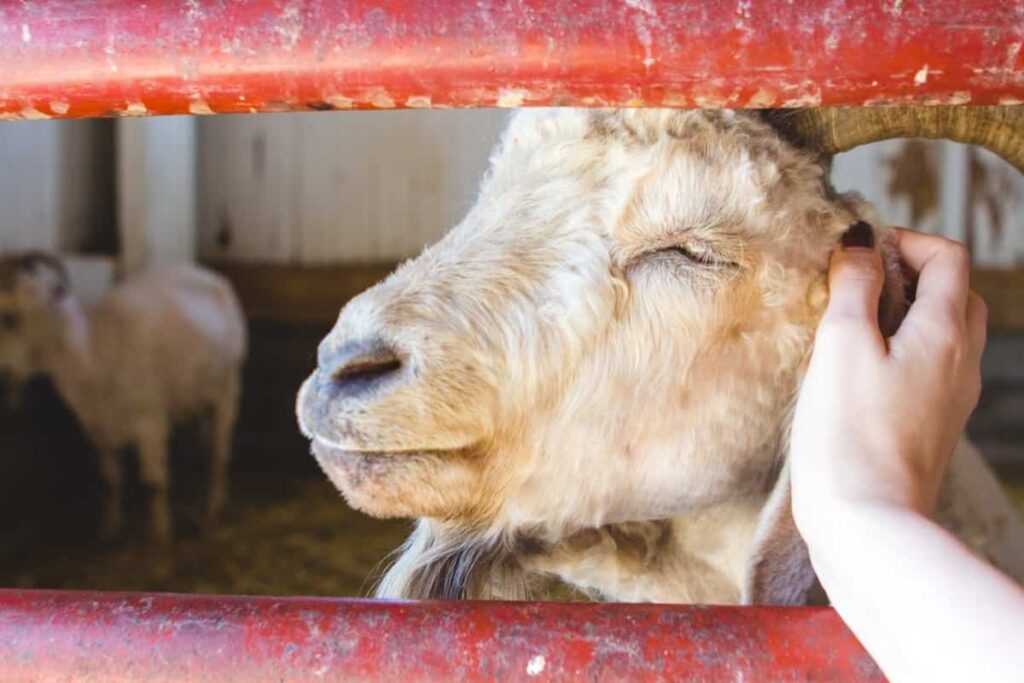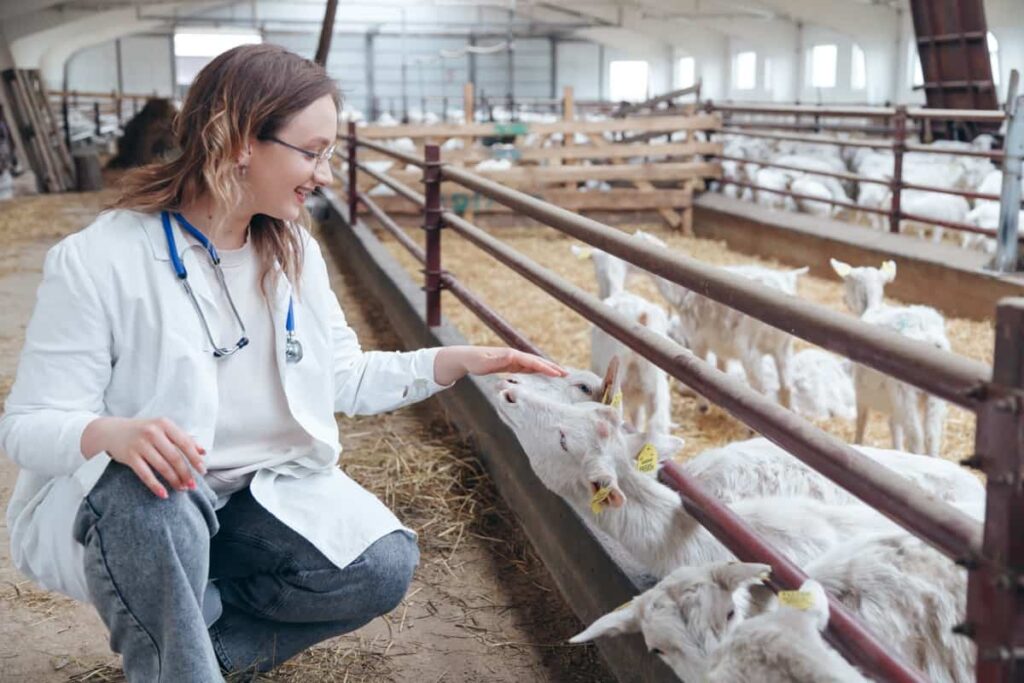It is the practice of raising goats for various purposes. These versatile animals have been domesticated for thousands of years and are found in different parts of the world. Awareness of the goat signs and symptoms of illness or disease is essential. By identifying these indicators early on, you can promptly ensure your goat’s health and well-being.

10 Goat Dying Symptoms
Loss of Appetite and Weight Loss in Goats
If your goat suddenly becomes disinterested in its food to eat, it could be a sign of goat illness or disease. Please pay close attention to any changes in their eating habits as it can quickly lead to weight loss. If you notice your goat becoming thin and losing its body condition, taking action promptly is important.
A healthy and well-nourished goat should maintain an appropriate weight for its age and breed. Observing other signs alongside the loss of appetite and weight loss is crucial to help narrow down the possible causes. Remember that early disease detection is essential to maintain the goat’s health.
Abnormal Behavior and Lethargy in Goats
One common abnormal behavior in goats is excessive bleating. While goats naturally vocalize, an increase in the frequency or intensity of their bleats might suggest discomfort or distress. Additionally, if a normally social goat becomes withdrawn and avoids interaction with other animals or humans, it could signal illness.
Lethargy is another concerning symptom to watch out for. A healthy goat is generally active and alert, so any noticeable decrease in energy levels should be taken seriously. Lethargic goats may appear weak and have difficulty standing or moving around as usual. It’s essential to consult a veterinarian specializing in treating goats to determine the underlying cause and develop an appropriate treatment plan.
Respiratory Distress and Coughing in Goats
One common cause of respiratory distress in goats is pneumonia, which can affect goats of all ages. This bacterial infection causes lung inflammation, coughing, rapid breathing, and nasal discharge. If left untreated, pneumonia can be fatal for goats. Another cause behind respiratory distress is lungworm infestation. These tiny worms infect the lungs and airways of goats through ingestion or inhalation of contaminated pasture or water sources. Consult a veterinarian specializing in livestock medicine for appropriate treatment options for your sick goat.
In case you missed it: How Much Space Do You Need for 100 Goats: Estimate for 200, 300, 400, 500, and 1000 Goats

Diarrhea and Dehydration Disorders in Goats
One of the main causes of goats’ diarrhea is a sudden diet change or consuming spoiled feed. This can disrupt their digestive system and result in loose stools. Other potential causes include bacterial or viral infections, parasitic infestations, and stress. When a goat has diarrhea, they may also exhibit signs of dehydration. These can include sunken eyes, dry mouth and nose, loss of skin elasticity, and decreased urine output.
Dehydration can be life-threatening if left untreated. If you notice your goat experiencing diarrhea and showing signs of dehydration, it’s crucial to intervene quickly. Provide plenty of fresh water for them, and consider offering electrolyte solutions specifically formulated for livestock. Remember that proper sanitation practices such as keeping feeding areas clean and regular deworming treatments are essential preventive measures against diarrheal diseases in goats.
Skin Lesions and Hair Loss in Goats
One of the signs that something might be wrong with your goat’s health is the presence of skin lesions and hair loss. These symptoms can indicate underlying issues, from external parasites to fungal infections or nutritional deficiencies. Taking immediate action is important when you notice skin lesions on your goats. Inspect their skin for redness, scabs, crusts, or open sores. Additionally, watch for patches where hair has been lost or thinned out.
External parasites like mites and lice can cause intense itching, scratching, and self-inflicted wounds. Fungal infections such as ringworm can also result in hair loss and scaly patches on the skin. To prevent further spread of infection or infestation within your herd, affected goats should be isolated until they receive appropriate treatment. Treatment options may include topical creams, ointments for external parasites, or antifungal medications for fungal infections.
Lameness and Joint Swelling in Goats
One possible cause of lameness and joint swelling in goats is arthritis, which causes joint inflammation. Arthritis can occur due to age-related wear and tear or as a result of an infection. Goats with arthritis may have difficulty walking or standing properly. Another potential cause of lameness is foot rot, caused by bacteria entering small cuts or wounds on the goat’s hooves. This condition leads to painful swelling and infection, making it difficult for the goat to walk normally.
Injuries can also result in lameness and joint swelling. These injuries often occur from accidents or rough play among goats. It’s crucial to provide a safe environment for your goats to minimize the risk of such injuries. Treatment options for lameness and joint swelling depend on the cause but may include medication, supportive care like rest, and bandaging if injuries are involved – always follow your vet’s recommendations closely.
Eye Discharge and Conjunctivitis in Goats
Eye discharge and conjunctivitis are common symptoms of illness in goats and should never be ignored. Excessive discharge is one of goats’ most obvious signs of eye problems. If you notice a yellow or greenish substance coming from your goat’s eyes, it could indicate an infection or inflammation. Additionally, if you see crusty or matted eyelashes, this may also be a sign that something is wrong.
In case you missed it: How to Feed Goats: A Chart/Table for Beginners

Conjunctivitis can also affect goats. This causes redness and swelling around the eyes and may increase tear production. It can make your goat uncomfortable and sensitive to light. Consult a veterinarian specializing in livestock care for proper diagnosis and treatment options. Preventing eye problems in goats involves maintaining good hygiene practices on your farm. Keep their living areas clean and regularly check their eyes for any signs of discomfort or abnormality.
Abdominal Pain and Bloating in Goats
Abdominal pain and bloating can be alarming symptoms in goats, indicating an underlying health issue that needs immediate attention. These symptoms may be caused by various factors such as gastrointestinal disorders, digestive problems, or even internal parasites. Bloating occurs when excess gas accumulates in the rumen, causing it to distend. This can lead to discomfort for the goat and potentially life-threatening complications if not addressed promptly.
To find the cause of abdominal pain and bloating in your goats, it’s crucial to assess their overall health condition. Check for any other accompanying symptoms, such as loss of appetite. Consulting a veterinarian is essential to diagnose these symptoms’ underlying causes accurately. Ensure proper feeding practices by providing high-quality forage, avoiding sudden dietary changes, and implementing a regular deworming schedule. Monitoring your goats closely can help detect potential issues before they escalate into more serious conditions.
Reproductive Issues and Infertility in Goats
These problems can affect male and female goats, leading to difficulties in breeding and reproduction. Identifying the signs of reproductive issues early on is crucial for managing these problems effectively. In females, one common sign of reproductive issues is an irregular estrus cycle or a complete absence of heat. This can make it difficult to determine the optimal time for breeding.
Additionally, if a goat has repeated miscarriages or fails to conceive, it may indicate underlying fertility problems. Male goats experiencing reproductive issues may exhibit difficulty mounting does during mating. They may also have low sperm count or poor sperm quality, making successful fertilization less likely. Various factors can contribute to reproductive issues in goats.
Nutritional deficiencies, hormonal imbalances, infections such as brucellosis or caprine arthritis encephalitis (CAE), genetic abnormalities, and aging can all play a role. To address these problems, working closely with a veterinarian specializing in goat reproduction is important. They can help diagnose the specific cause of infertility and develop a targeted treatment plan tailored to your goats’ needs.
Neurological Symptoms and Seizures in Goats
One common neurological symptom is involuntary muscle contractions. This can affect the entire body or specific limbs, causing the goat to shake uncontrollably. Another sign is stumbling or losing coordination, where the goat may have difficulty walking straight or maintaining balance.
In case you missed it: How to Find Goat Farm Near You: Simple Tips and Ideas for Your Location Search

Seizures are also indicative of neurological problems in goats. During a seizure, a goat may exhibit convulsions, twitching movements, foaming at the mouth, and even temporary loss of consciousness. A goat displaying these behaviors might require immediate veterinary attention as they could indicate serious issues like brain inflammation or damage.
Conclusion
Identifying signs of illness and disease in goats is crucial for their health and well-being. Being observant and proactive in recognizing abnormal behaviors or physical symptoms that could indicate an underlying issue is important for a goat farmer. Goats can be utilized in land management practices such as grazing overgrown vegetation or controlling weeds on farms or pastures. This makes them valuable assets in maintaining healthy ecosystems.
- Types of Grass Growing for Goat Farm
- How to Train Goats for Milking: A Beginners Guide
- Goat Milking Practices and Equipment: A Beginner’s Guide
- Goat Farming for Fiber: Producing Mohair and Cashmere
- Maximizing Goat Milk Production: Tips for Dairy Goat Farmers
- Goat Farming as a Family Business: Strategies for Success
- Profitable Kenya Goat Breeds for Commercial Dairy and Meat Business
- Unlock the Secrets of Oberhasli Goat: Discover Raising and Management Practices
- Ultimate Guide to Myotonic Goats: Explore Profile to Raising